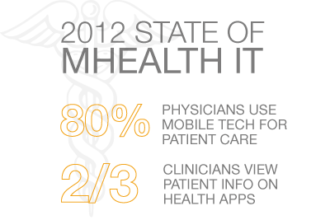I recently wrote, in Do’s and Don’ts of hospital health IT, that you shouldn’t make long-term decisions on mobile app platforms like iOS and Android because the mobile world is still quite young and the war between Apple, Microsoft, and Google is nowhere near being resolved. A couple of readers, in the comments section (thanks Anne and DDS), asked me to elaborate mobile and mHealth strategy for healthcare professionals (HCPs) and hospitals.
A couple of the key points were:
I recently wrote, in Do’s and Don’ts of hospital health IT, that you shouldn’t make long-term decisions on mobile app platforms like iOS and Android because the mobile world is still quite young and the war between Apple, Microsoft, and Google is nowhere near being resolved. A couple of readers, in the comments section (thanks Anne and DDS), asked me to elaborate mobile and mHealth strategy for healthcare professionals (HCPs) and hospitals.
A couple of the key points were:
- (Anne) how can you avoid making long-term mobile decisions at this point? After all, hospitals that don’t steer their doctors are going to be managing whatever technology the doctors invest in, aren’t they?
- (DDS) the risk is that people will take this to mean that they shouldn’t move at all on mobile app platforms, and this would be a mistake. This is the perennial issue with health IT; if it’s not perfect, then wait.
The approach I recommend right now for mobile apps, if you’re developing them yourself, is to stay focused on HTML5 browser-based apps and not native apps. So, to answer Anne’s and DDS’s question specifically, no you shouldn’t wait to allow usage of mobile apps by anyone; but, if you’re looking to build your own apps and deploy them widely (not in simple experiments or pilots) then you shouldn’t write to iOS or Android or WP7 but instead use HTML5 frameworks like AppMobi and PhoneGap that give you almost the same functionality but protect you from the underlying platform wars. In the end, HTML5 will likely win and it’s cross-platform and quite functional for most common use cases. If you’re not developing the apps yourself and using third-party apps, then of course you must support the use of iOS native, Android native, and soon Windows native apps on your network.
So, from a general perspective you should embrace mHealth but do so in a strategic, not tactical manner. Here are the most critical questions to answer in a mHealth strategy — it’s not a simple one size fits all approach:
- How will you allow doctors’ or patients’ own devices within your hospitals / organizations — simply by providing connectivity and wireless access on the production network or some other means?
- How will you allow doctors’ own devices to connect to hospital IT systems?
- How will you extend hospital IT systems via hospital-owned mobile devices?
- How will you allow the hospital or organization to “prescribe” the use of apps to patients and track the usage of apps?
- How will you approve or deny the use of certain apps that may not meet FDA regulations if they get close to MDDS or Class 1/2/3 devices?
If there is interest in this topic, I will expand on my list of Do’s and Don’ts — mHealth is a very complex topic and requires a good strategy. Just saying that you allow the use of mobile devices like smartphones in your hospital is not an mHealth strategy. ![]()








